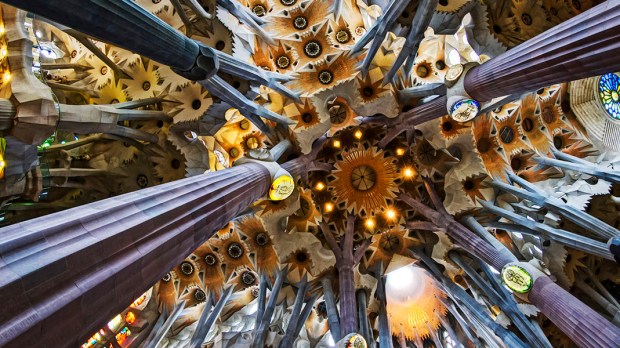The Basilica of the Sagrada Familia (“Holy Family”) of Barcelona, Spain, which is still under construction, was also on the list of targets of the terrorists who carried out two attacks elsewhere in the capital city of the Spanish autonomous region of Catalonia on Thursday, August 18, 2017. Fr. Lluís Bonet, pastor of Sagrada Familia parish and vice-postulator of the cause of beatification of Antoni Gaudí, the church’s architect, opened the doors of the church to us a week after the attacks. Fr. Bonet took us on a visit to Gaudí’s tomb in the crypt, and he showed us documents, periodicals from the the architect’s time, and folders containing documentation supporting the process of beatification. The cause is now in Rome, waiting for Antoni Gaudí i Cornet (1852-1926) to be declared venerable.
Gaudí, a passionate architect, left behind a body of work that reflects his knowledge of nature, his piety, and his love for liturgy, his fellow man, his homeland, his language, his culture, and his family. His most famous work on an international level is the Sagrada Familia.
Gaudí didn’t like to write
The visionary artist left everything said in stone. John Paul II, in the autumn of 1982, visited Sagrada Familia, and said, “This Church of the Holy Family is still an incomplete work, but it is solid right from the start: it commemorates and summarizes another construction, one construction made with living stones: the Christian family, where faith and love are born and are constantly cultivated.” Pope Benedict consecrated the church in November of 2010.
Today, this is one of the most emblematic buildings in Barcelona, and it attracts people from every continent. “Many Japanese,” Fr. Bonet comments, and then he corrects my assumption: “Not only them; people come from all around the world.” The handouts and information are translated into dozens of languages, from Slovene to Korean.
Is he afraid, knowing that the terrorists wanted to attack Sagrada Familia? I wait while the priest, key in hand, opens the door to the crypt of Our Lady of Mount Carmel, and takes me to Antoni Gaudí’s tomb. He turns around, looks at a side chapel where a precious crucifix is on display, and he answers me while looking at Christ: “Afraid? Him, they killed. There’s nothing more to say.”
Bonet has lived for 24 years in what was Gaudí’s little house, just outside and to the left of the basilica’s Façade of Glory. This priest is the son of Lluís Bonet i Garí, an architect who was a disciple of Gaudí and who continued the construction of Sagrada Familia after the latter’s death.
Bonet carries in his mind many anecdotes and memories. I ask him if he believes that Gaudí will be canonized by 2026, the centenary of his death. He looks at me with a firm gaze and answers, “We’ll see.” It doesn’t worry him. He has studied and written about the virtues of this Christian architect from Catalonia, and is convinced that he will be raised to the altars.
Before pausing to pray at the tomb, Fr. Bonet hands me bulletins containing correspondence, testimonies, and writings about Gaudí. “People tell us about graces they’ve received, they ask for favors [through his intercession]; they communicate with us continuously,” he tells me. Besides the fervor of believers, Gaudí also attracts tourists, who see in Gaudí, as did Bishop Ragonesi in 1915, the “Dante of Architecture,” and who consider the Sagrada Familia to be “the greatest Christian poem written in stone.”
Gaudí and the peanuts
Among the testimonies included in the bulletins about Gaudí, one is particularly endearing: ” I remember Gaudi wearing an old long coat and sometimes he would put his hands into his pockets and take out peanuts.” The story is told by Xita Sugranyes—perhaps the only person alive who remembers the day Gaudí died—in one of the interviews contained in the 27th edition of “God’s Architect,” the bulletin published by the Association for the Beatification of Antoni Gaudí, created in the year 1992. You can read and download that edition of bulletin here. You can subscribe to receive the bulletins by email by sending a request to: gaudibeatificatio@gmail.com
Here is the prayer for private devotion to Gaudí:
God our Father, you instilled in your servant Antoni Gaudí, architect, a great love for your Creation and a burning desire to imitate the childhood and passion mysteries of your Son. Grant, by the power of the Holy Spirit, that I also may learn to dedicate myself to a well-done work and glorify your servant Antoni, granting me, through his intercession the favor I request (here make your petition). Through Christ our Lord, Amen. Jesus, Mary and Joseph, grant us peace and preserve the family. (three times)

